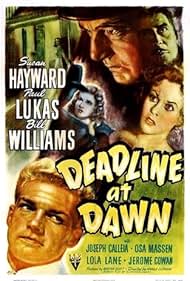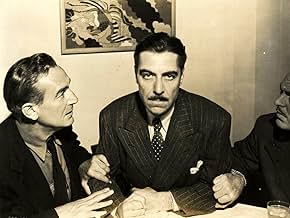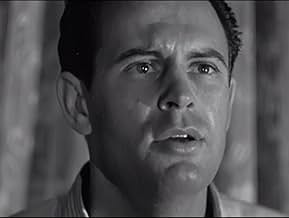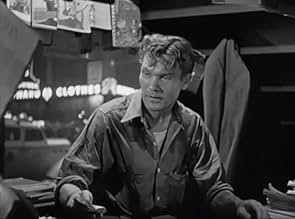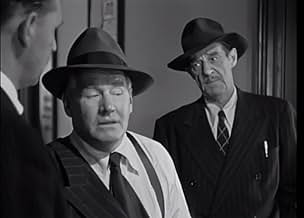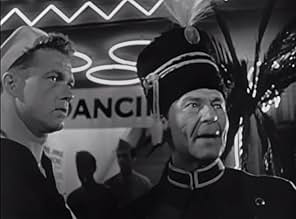PUNTUACIÓN EN IMDb
6,8/10
2,4 mil
TU PUNTUACIÓN
Añade un argumento en tu idiomaAfter a woman he meets is murdered, a soon-to-ship-out sailor has until dawn to find the killer, aided by a weary dance hall girl.After a woman he meets is murdered, a soon-to-ship-out sailor has until dawn to find the killer, aided by a weary dance hall girl.After a woman he meets is murdered, a soon-to-ship-out sailor has until dawn to find the killer, aided by a weary dance hall girl.
- Dirección
- Guión
- Reparto principal
- Premios
- 1 nominación en total
Ernie Adams
- Waiter
- (sin acreditar)
Fred Aldrich
- Beefy Nightclub Guest
- (sin acreditar)
Walter Bacon
- Commuter
- (sin acreditar)
John Barton
- One-Legged Man
- (sin acreditar)
Billy Bletcher
- Waiter
- (sin acreditar)
Reseñas destacadas
Terrific performances by many actors make this 1946 noir a joy to watch. Nifty murder mystery directed by Harold Clurman and written by Clifford Odets. As mentioned elsewhere on this board the dialog is wondrous; you never know what anyone will say, and everyone seems to "wax philosophic" throughout the film.
The action follows a murder of a woman and how it involves a sailor on leave, a dance-hall girl, and a taxi driver. The story takes place on a sweltering New York night in the early hours. The sailor must catch a 6 AM bus, so there's the "deadline at dawn." As the protagonists track down clues, they run across a bizarre collection of shady types, and everyone seems to to capable of murder, especially of this particular woman.
Susan Hayward gives a stunning performance as June. She starts out as a wisecracking and downhearted taxi dancer who resists getting involved but can't help herself since the sailor (Bill Williams) seems so innocent and naive. She calls him Boob McNutt. As they race around the city tracking down clues (this city never sleeps) they meet a world-weary taxi driver (Paul Lukas) who helps out. All three stars give amazing performances here.
Supporting players are also a knockout with Lola Lane terrific as the victim, Joseph Calleia as her creepy brother, Osa Masson (with a limp), and Marvin Miller, Jerone Cowan, Constance Worth, Al Bridge, Steven Geray, Joseph Crehan and others all solid.
Odets' writing is excellent even if all the characters seem to talk in the same poetic language. But it becomes mesmerizing as the characters seek the truth and talk. It seems that everyone is city wise but a poet at heart.
Hayward looks great with her hair pinned up (it's a sultry night) with bobby pins. She wears little makeup. Williams is also wonderful as the sailor who's not quite as dumb as he seems. Lukas is also solid as the surprising taxi driver.
Great film noir with touches of poetry and humor. What more could you want?
The action follows a murder of a woman and how it involves a sailor on leave, a dance-hall girl, and a taxi driver. The story takes place on a sweltering New York night in the early hours. The sailor must catch a 6 AM bus, so there's the "deadline at dawn." As the protagonists track down clues, they run across a bizarre collection of shady types, and everyone seems to to capable of murder, especially of this particular woman.
Susan Hayward gives a stunning performance as June. She starts out as a wisecracking and downhearted taxi dancer who resists getting involved but can't help herself since the sailor (Bill Williams) seems so innocent and naive. She calls him Boob McNutt. As they race around the city tracking down clues (this city never sleeps) they meet a world-weary taxi driver (Paul Lukas) who helps out. All three stars give amazing performances here.
Supporting players are also a knockout with Lola Lane terrific as the victim, Joseph Calleia as her creepy brother, Osa Masson (with a limp), and Marvin Miller, Jerone Cowan, Constance Worth, Al Bridge, Steven Geray, Joseph Crehan and others all solid.
Odets' writing is excellent even if all the characters seem to talk in the same poetic language. But it becomes mesmerizing as the characters seek the truth and talk. It seems that everyone is city wise but a poet at heart.
Hayward looks great with her hair pinned up (it's a sultry night) with bobby pins. She wears little makeup. Williams is also wonderful as the sailor who's not quite as dumb as he seems. Lukas is also solid as the surprising taxi driver.
Great film noir with touches of poetry and humor. What more could you want?
Little know post-WWII Film-Nior gem set in New York City on a hot sweltering summer night with one of the most unusual murder mysteries you'll ever see. The movie starts out with Sleepy Parsons, Marvin Miller, pleading with his estranged wife Edna, Lola Lane, for the $1,400.00 that she owes him. Edna after insulting the poor blind and very sick man Sleepy finds out that the money, Sleepy's $1,400.00, that she had in her purse is gone! what happened to it?
Earlier that evening Edna met this young sailor Alex, Bill Williams,on leave at a restaurant that her gangster brother Val Bartelli, Joseph Calleia, owned. After getting him drunk Val cheated him, playing cards, out of his pay. The story got even weirder when Edna telling Alex that she'll pay him to goes up to her place to fix her radio, Alex is a radio repairman in the navy, and got the poor slob even more drunk where he lost consciousness. waking up at a news stand after being given a cup of strong coffee by the newspaper man to clear his mind Alex staggered up on his feet a wad of $1,400.00 falls out of his pocket, where did it come from?
Going to a dance-hall later that night Alex gets very friendly with a local dance girl June, Susan Hayward. After June finished dancing with the costumers Alex goes with June to her place to have a bite to eat. At June's place Alex gets this bright idea to go back to where Edna lives and return the $1,400.00 ,which he feels is hers, with June coming along for the ride. When both get there they find, to their surprise and shock, that Edna was murdered, who did it? was it Alex? was it Sleepy? was it about a half dozen other suspects who had some connection with Edna? All I can say about the movie is that it will floor you with an ending that you won't see coming and even when it does! It will take you a while to realize what you missed in the clues that were so skillfully dropped leading to it all throughout the film.
"Deadline at Dawn" is one of those films that just sticks with you right from the start. Even though there's a number of flaws in it you easily overlook them when you realize that it's going in a direction that will more then make up for them, with it's almost unbelievable ending. Paul Lukas as NYC Cabbie, Gus Hoffman,is at first just an innocent bystander who picks up the couple, Alex & June.
As the movie goes on he becomes more and more central to the story by being more of a detective then a taxi driver as well as having the knowledge of a Ivy League Collage professor! whats this guy doing driving a cab? As the trio slowly work together time is running out to find out not only who murdered Edna but to also clear Alex of the crime, in which he's the prime suspect, and at the same time make it possible for Alex to catch the 6;00AM bus to Norfolk Virginia to report to his ship.
Powerful and surprising ending that has elements to it that you just rarely see in movies today and never in movies back then, in the 1940's. It really has you thinking about what is really good and bad in the world. Like I said before the ending just floored me not that it was so surprising, it was, but that it shows just how human and imperfect people are in the movie as well as they are in real life.
Earlier that evening Edna met this young sailor Alex, Bill Williams,on leave at a restaurant that her gangster brother Val Bartelli, Joseph Calleia, owned. After getting him drunk Val cheated him, playing cards, out of his pay. The story got even weirder when Edna telling Alex that she'll pay him to goes up to her place to fix her radio, Alex is a radio repairman in the navy, and got the poor slob even more drunk where he lost consciousness. waking up at a news stand after being given a cup of strong coffee by the newspaper man to clear his mind Alex staggered up on his feet a wad of $1,400.00 falls out of his pocket, where did it come from?
Going to a dance-hall later that night Alex gets very friendly with a local dance girl June, Susan Hayward. After June finished dancing with the costumers Alex goes with June to her place to have a bite to eat. At June's place Alex gets this bright idea to go back to where Edna lives and return the $1,400.00 ,which he feels is hers, with June coming along for the ride. When both get there they find, to their surprise and shock, that Edna was murdered, who did it? was it Alex? was it Sleepy? was it about a half dozen other suspects who had some connection with Edna? All I can say about the movie is that it will floor you with an ending that you won't see coming and even when it does! It will take you a while to realize what you missed in the clues that were so skillfully dropped leading to it all throughout the film.
"Deadline at Dawn" is one of those films that just sticks with you right from the start. Even though there's a number of flaws in it you easily overlook them when you realize that it's going in a direction that will more then make up for them, with it's almost unbelievable ending. Paul Lukas as NYC Cabbie, Gus Hoffman,is at first just an innocent bystander who picks up the couple, Alex & June.
As the movie goes on he becomes more and more central to the story by being more of a detective then a taxi driver as well as having the knowledge of a Ivy League Collage professor! whats this guy doing driving a cab? As the trio slowly work together time is running out to find out not only who murdered Edna but to also clear Alex of the crime, in which he's the prime suspect, and at the same time make it possible for Alex to catch the 6;00AM bus to Norfolk Virginia to report to his ship.
Powerful and surprising ending that has elements to it that you just rarely see in movies today and never in movies back then, in the 1940's. It really has you thinking about what is really good and bad in the world. Like I said before the ending just floored me not that it was so surprising, it was, but that it shows just how human and imperfect people are in the movie as well as they are in real life.
This is a strange little movie, which I'm sure is primarily due to Clifford Odets bizarre screenplay, but I freely admit that I really enjoyed it! The plot is somewhat convoluted (although not as hard to follow as some make out) and the ending is a little 'feel good' for a noir but Odets' dialog is what will bring you into it - or push you out. I still can't figure if the way his characters speak is closer to real life than 'regular' movie dialog, or nothing at all like anyone speaks; it somehow manages to be a little of both. One thing for sure is this is not how people normally speak in movies. Strong performances by Susan Hayward and Paul Lukas contribute to the fun; and that's what I found it to be. You've got likable characters, clever dialog, a mystery to solve before dawn, and Susan Hayward looking as good as I can remember. What else do you need?
The real star of this underappreciated noir is Clifford Odets' dialogue, which you either love or you hate. I love it. Really terrific performances, and even the bit players are memorable. Look for Group Theater vet Roman Bohnen in a tiny role as the building janitor with a dead cat-- "she could practically speak." Or Jerome Cowan, a B-movie actor in a zillion Forties flicks, wonderfully slimy as a Broadway producer. Filmed on a backlot, but it seethes New York more than most location movies.
A young sailor on leave wakes up at midnight in a newsstand with bundles of money in his pockets and no recollection of his time spent with the wrong woman. Of course she turns out to be dead and he has until a bus leaves at 6am to discover the culprit or he gets the rap.
I like films with concentrated wandering, this one has it, the entire film like a slow ride across New York after hours in the backseat of a cab with windows rolled down, it's the middle of August, the macadam breathing out the day's heat again, or like lounging by the open window of your apartment with lights turned off, glimpses of strange figures stalking the empty and sweltering streets below and imagining mischief from them.
It has mood above all, latenight paranoia being sweated out from pores in the skin. Everything looks a bit unhinged in that magic-desolate way that is summer in the big city.
But this is deeply noirish in a key way, the way of the dumb guy's dream that crystallizes the essence of noir. Our man was out at night dreaming but has no recollection what about, except it involved offers of sex and illicit money. We presume he's innocent because of his naive blond looks and because he's the one telling the story, and is bewildered as he does, because more likely suspects are paraded, stories are piled, testimonies, conjecture, a drunk man uncovers hidden truth, a cab driver reflects about love, but the puzzle persists, the puzzle that is the night of life; we cannot really know, there is a blank spot at the center. Emptiness behind the stories that we make up to narrate our private worlds.
You will need no more eloquent parallel about what this is all about than a blind pianist among the suspects and being - mistakenly - sussed from his melodramatic reaction.
So we have sinister happenings back in the waking world, itself rendered as something you wake up from. Then our film as a dream attempting inner balance, so of course thick in coincidence, in strange but kind souls assisting, capped off with a miraculous revelation in the end that absolves guilt.
This is truly wonderful stuff that has burned itself into my visual imagination. It's clean and dark both, the shadows all in having traveled, having dreamed the night away.
I like films with concentrated wandering, this one has it, the entire film like a slow ride across New York after hours in the backseat of a cab with windows rolled down, it's the middle of August, the macadam breathing out the day's heat again, or like lounging by the open window of your apartment with lights turned off, glimpses of strange figures stalking the empty and sweltering streets below and imagining mischief from them.
It has mood above all, latenight paranoia being sweated out from pores in the skin. Everything looks a bit unhinged in that magic-desolate way that is summer in the big city.
But this is deeply noirish in a key way, the way of the dumb guy's dream that crystallizes the essence of noir. Our man was out at night dreaming but has no recollection what about, except it involved offers of sex and illicit money. We presume he's innocent because of his naive blond looks and because he's the one telling the story, and is bewildered as he does, because more likely suspects are paraded, stories are piled, testimonies, conjecture, a drunk man uncovers hidden truth, a cab driver reflects about love, but the puzzle persists, the puzzle that is the night of life; we cannot really know, there is a blank spot at the center. Emptiness behind the stories that we make up to narrate our private worlds.
You will need no more eloquent parallel about what this is all about than a blind pianist among the suspects and being - mistakenly - sussed from his melodramatic reaction.
So we have sinister happenings back in the waking world, itself rendered as something you wake up from. Then our film as a dream attempting inner balance, so of course thick in coincidence, in strange but kind souls assisting, capped off with a miraculous revelation in the end that absolves guilt.
This is truly wonderful stuff that has burned itself into my visual imagination. It's clean and dark both, the shadows all in having traveled, having dreamed the night away.
Argumento
¿Sabías que...?
- CuriosidadesJoe Sawyer's character of washed-up baseball player Babe Dooley was based on Chicago Cubs hitting great Hack Wilson whose alcoholism led to his steep professional and personal decline.
- PifiasAt the end, the main characters exit the 8th Police Precinct. It is night, and the streets are deserted. Yet when June and Alex drive away in the police car, it can be seen through the back window of the vehicle that the streets are bustling with activity, cars, and people, and it's bright and sunny.
- Citas
June Goffe: If you hear a peculiar noise, it's my skin creeping.
- ConexionesFeatured in Noir Alley: Deadline at Dawn (2017)
Selecciones populares
Inicia sesión para calificar y añadir a tu lista para recibir recomendaciones personalizadas
- How long is Deadline at Dawn?Con tecnología de Alexa
Detalles
- Fecha de lanzamiento
- País de origen
- Idiomas
- Títulos en diferentes países
- Un amanecer trágico
- Localizaciones del rodaje
- Backlot, 20th Century Fox Studios - 10201 Pico Blvd., Century City, Los Ángeles, California, Estados Unidos(New York night street scenes)
- Empresa productora
- Ver más compañías en los créditos en IMDbPro
- Duración1 hora 23 minutos
- Color
- Relación de aspecto
- 1.37 : 1
Contribuir a esta página
Sugerir un cambio o añadir el contenido que falta

Principal laguna de datos
By what name was Muerte al amanecer (1946) officially released in India in English?
Responde